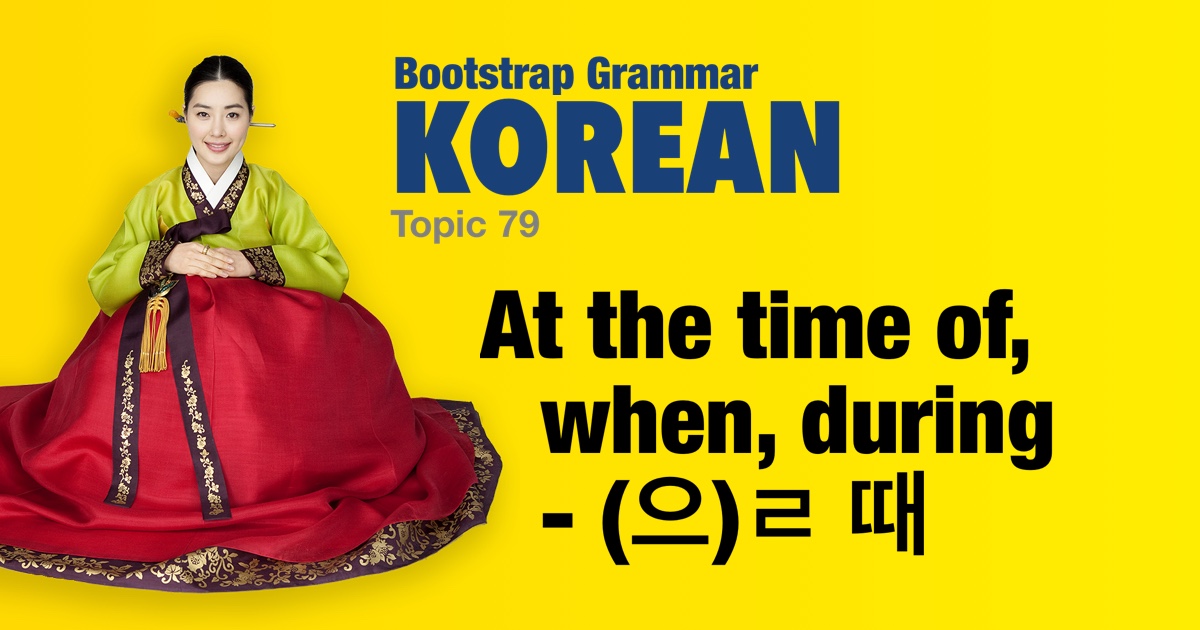Korean grammar - At the time of, when, during - (으)ㄹ 때 |
|||
|
|||
Pattern: Verb form + (으)ㄹ 때 The Verb ending (으)ㄹ 때 denote simultaneous actions. -- Recall that we previous used 동안(에) to say 'during' a noun. Attaching 때 itself to a noun is also possible but there are only a limited number of nouns for which this is done colloquially. 동안에 (during) is usually better with nouns. |
| Examples: | |
|
시간이 없을 때 자주 햄버거를 먹어요.
When (I) don't have time (I) often eat hamburger. |
|
|
대학생이었을 때 보통 늦게 일어났어요.
When (I) was a university student, (I) usually wake up late.
|
|
|
저는 운전할 때 음악을 듣는 것을 좋아해요.
I like listening to music when driving. |
|
|
미국에 살았을 때 영어를 배웠어요.
When (I) was living in USA, (I) learned English. |
|
|
밖에서 놀았을 때 날씨가 좋았어요.
When (we) were playing outside, the weather was good. |
|
|
오늘 밤 자러 갈 때 눈이 오고 있을 거예요.
It will be snowing when (I) go to bed tonight.
|
|
|
시간이 없을 때 종종 맥도날드에서 식사를 해요.
When (I) don't have time, (I) sometimes eat at McDonalds.
|
|
|
대학생이었을 때 보통 늦게 일어났어요.
When (I) was a college student, (I) usually woke up late. |
|
|
밖에서 놀았을 때, 날씨가 좋았어요.
When we played outside, the weather was nice. |
|
|
저는 선생님이지만 어렸을 때 학교 가기 싫었어요.
I'm a teacher, but when (I) was young, (I) didn't want to go to school. |
|
|
요리를 할 때 친구와 이야기를 나눴어요.
When (I) was cooking, (I) was talking with a friend. |
|
|
우리 할아버지가 젊었을 때 한국에서 전쟁이 시작되었어요.
The war started in Korea when our grandfather was young.
|
|
|
그녀가 노래를 부르기 시작했을 때, 모든 사람들은 깜짝 놀랐어요.
When she started singing a song, (it) surprised everyone.
|
|
|
일본어를 잘 할 수 있을 때 일본에 같이 F664!
When (you) can speak Japanese, let's go to Japan together. |
|
|
바쁘지 않을 때 전화해요.
Call when (you) are not busy. |
|
|
캐나다에 있는 동안 새 컴퓨터를 살 거예요.
While (I) am in Canada (I) will buy a new computer. |
|
|
운전할 때 휴대전화를 사용하면 안 되잖아요.
As you know, (you) can't use (your) cell phone while driving.
|
|
|
열여덟 살 때 첫 데이트를 했어요.
(I) went for the (my) first date when (I) was eighteen.
|
|
|
그 컴퓨터는 작동을 시작할 때 삐 하는 소리가 나요?
Does the computer (say) beep when it starts up?
|
|
|
영화를 보고 있었을 때 전화벨이 울렸어요.
While (we) were watching the movie, the phone rang.
|
|
|
방학 때 아르바이트를 해요.
(I) work part-time during the school holidays.
|
|
|
일곱 살 때 사진이에요.
This is a picture (of me) when (I) was seven years old.
|
|
|
한국에서는 추석 때 모든 가족이 한자리에 모여요.
In Korea, the whole family gathers in one place during Chuseok.
|
|
 |
|




